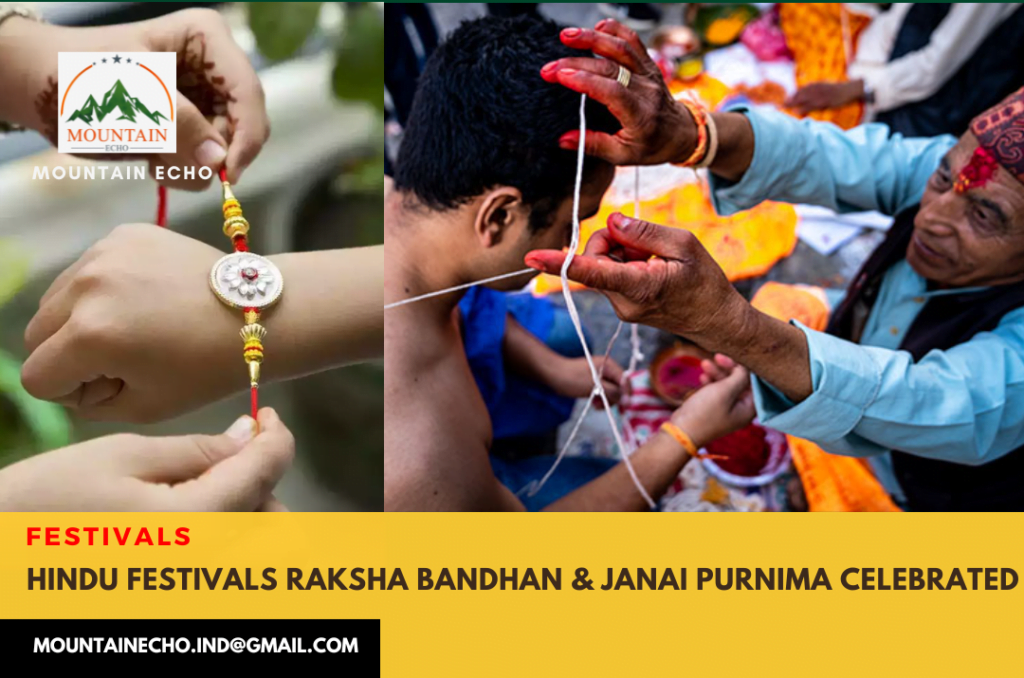Hindu Festivals Raksha Bandhan and Janai Purnima celebrated in India and Nepal
WhatsApp Channel
Join Now
Hindu festivals – Raksha Bandhan and Janai Purnima today are being celebrated across India and Nepal with full ritualistic fervor and devotion.
Janai Purnima is the festival of threads with ritualistic bath (bathing) and tying the sacred thread “Rakshya Bandhan” on the wrist and “Janai” across the body by Hindu devotees.
In the early morning of Thursday, the Batuks- novice priests took part in a mass bathe ceremony chanting hymns and mantras, making offerings to the God Sun and goddesses
Meanwhile people gather on the embankments of holy Bagmati river to change and tie threads on their wrists, as the nation marks the festival of thread. “Janai, itself is a sacred thread that is believed to have emerged from the Yagya, sacrificial rite or performance of duty (Priest Recites religious sermon).”
A person who wears this sacred thread is full of energy, has two parts and each part contains three threads (Religious sermon), the first is Bramha, the second is Bishnu and the third is lord Shiva. These are the symbols of knowledge, meditation and power.
“On the other side is nature who also are considered the female companions of males. Saraswati of Bramha, Laxmi of Bishnu and Parbati of Shiva,” Sudharshan Prasad Dhudari, a priest on the premises of Pashupatinath temple told ANI.
Commonly called Janai Purnima or ‘Rishi Tarpani’ the tagadharis or those who wear the ‘Janai’ (the sacred thread) around their bodies from the left shoulder to right change the sacred thread today after having a haircut and a bath.
Those who don’t wear Janai reach to the nearby religious site and receive the ‘Raksha Bandhan’ thread, which is tied around the wrist as an amulet. The yellow thread is purified through the chanting of mantras by Brahmin priests as a symbol of protection from fear and disease.
“Those who wear this Rakshya Bandhan” would protect the person, extend the lifespan of the people and bring peace to life. This sacred thread is made through the combination of 27 different types of threads. In astrology, there are 27 types of constellations, name of every human being is believed to be recorded in these constellations and this thread is tied around the wrist following the folklore about King Bali.”
Bali earned more virtue which threatened the throne of King Indra. Then after Bramha tied the thread around the wrist and it has been followed since then in remembrance of lord Bali,” Priest Dhudhari added.
To mark these Hindu festivals, religious fairs are held at Gosainkunda, an alpine area in Rasuwa District, and at Dansanghu, Triveni in Jumla District to observe the festival with offerings to Lord Shiva. On the side of Pashupatinath Temple, the Bhagwat Sanyash Ashram Gurukul, near the Ram Temple on the morning organised Mass bathing ceremony and performed the rituals.
The occasion is also observed as ‘Kwanti Purnima’ by the Newar community. Kwanti, a soup prepared from nine different beans, is a special delicacy added to the Nepali menu today.<br>In the Tarai region, there is a tradition in which sisters tie an attractive ‘Rakhi’ around the wrist of their brothers wishing them long lives and prosperity.
Today, thousands of devotees worship lord Shiva at Pashupatinath in Kathmandu and at Kumbheswar in Lalitpur and other Shiva temples across the country, and take holy dips in ponds lakes and rivers.
“The bearer of Janai gets wisdom, prosperity strength and many other virtues granted by religious scripts and as a Bramhin, there’s something you need to wear When I was young I had a ceremony called ‘Bratabandha’ after that, and I was handed this Janai and told that I should wear this for all those virtues,” Raju Adhikari, a devotee told ANI.
A big religious fair takes place at the Gosainkunda Lake and pilgrims come from faraway places to take a holy dip in this lake and other lakes nearby. Religious fairs are organised at Pashupati and Manichud of Kathmandu; Gosainkunda of Rasuwa; Kumbheshwar of Lalitpur; Panchpokhari of Sindhupalchok; Janakpurdham, Dhanush Sagar and Ganga Sagar of Dhanusha, Dansanghu of Jumla and Trivenidham of Nawalparasi.
Along with these Hindu festivals, the Buddhists observe this day in commemoration of Lord Gautam Buddha’s victory over the evil power of lust. This episode is well-described in the Buddhist scripture ‘Lalitbistar’. A special fair takes place at Swayambhunath in Kathmandu on this day.
Similarly, Raksha Bandhan is another Hindu festivals observed mostly by the Madhesi community on this day. Sisters offer rakhi (a talisman, a symbol of protection) to their brothers and tie it around their wrists. Raksha Bandhan or Rakhi is believed to protect the brothers while the brothers take a vow to protect their sisters. (ANI)
The Story is picked up from ANI and Mountain Echo has not edited the story.
Telegram Channel
Join Now



